Presidential election: Who wins it?
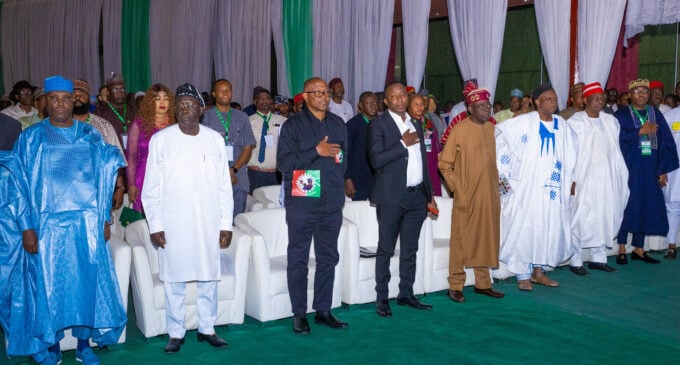
BY CHRIS OGUGUO
Today the 25th of February, 2023, represents a significant date in Nigeria’s calendar. It is the day that a new president is elected to replace President Muhammadu Buhari, who would have served a two-term, eight-year tenure by May 29.
So, it is D-day; Atikukates vs Obidients vs BATists — who wins?
Well, as you vote, here are a few things that will determine who wins that you must know:
- Section 134 (2) of the 1999 constitution says that for anyone to be declared president, (s)he must secure the highest number of popular votes, while at least 25% of those votes must spread across 2/3 of the states = 24
- Where no candidate achieves that, the constitution requires a rerun within 21 days
- In a rerun, only TWO candidates will participate
So, who are the two candidates that will face off in a rerun?
The Two Candidates Facing Off In A Rerun Will Be:
- The candidate with the majority of (popular) votes
- The candidate with the majority of votes in the majority of states
It’s important to understand Number 2. It is NOT the candidate with the second-highest number of popular votes, but the one with the widest spread. There’s a distinction.
So, who will win the 2023 presidential election? Let’s look at the numbers
According to INEC, there is a total number of 93.4 million registered voters for these elections.
Also, according to INEC, the average voter turnout since 1999 is 35%. So, if we go by those figures, it is expected that 32.6 million Nigerians will vote today across the country.
However, since this election is likely going to be the most keenly contested, unpredictable, and with the seeming voter enthusiasm, I will personally project an average of 45% voter turnout today. With this assumption, we will have 42 million votes today
So, Who Wins It?
According to INEC, the north-west has the highest number of registered voters with 22.2 million, followed by the south-west with 17.9 million. The north-central is third with 15.3 million, while the south-south has 14.4 million. The north-east and south-east have the lowest voter registration with 12.5 million and 10.9 million respectively.
Remember, for anyone to emerge the winner, they must have the highest number of total votes cast plus 25% in at least 24 states.
Can any of the three prominent candidates win this on the first ballot? It doesn’t seem so if we’re to go by party strength, candidate popularity, voter enthusiasm, religion, and ethnicity.
Yes, religion and ethnicity will be a major decider.
Party Strength
Of the three front-line parties, the APC and PDP are the strongest. With the exception of Anambra, both parties have a collection of governors across the country, with the APC having 21, the PDP 14, and APGA 1. The APC also controls the central government.
The implication of this, to a large extent, is that parties would normally perform better and possibly win the states where they have governors. However, developments surrounding this presidential election seem to be a bit of an anomaly, so this may not be the case for the entirety of the states.
There will be upsets in states — another party winning a state where they don’t have a governor.
Candidate Popularity
By far the most popular candidate in this election cycle (on social media at least) is Peter Obi of the Labour Party.
Obi was a member of the PDP until May of last year, and was the running mate to the current candidate of the PDP, Atiku Abubakar in the 2019 presidential election. Obi is popular with the youths and people who strongly argue that the presidency should return to a southern Christian. His cause is further pushed by narratives that it’s the turn of the Igbos, who are yet to produce a democratically elected president since 1960 when Nigeria gained independence from Britain.
While Atiku Abubakar of the PDP and Bola Tinubu of the APC have varying degrees of popularity, none has been able to match Obi in that regard.
The implication of this is that Obi has the most recognisable name in this election cycle, at least amongst the youth and urban dwellers. Will this be enough to win him the election, though?
Voter enthusiasm
The 2023 presidential election seems the most anticipated since 1999. For only the second time in that time frame, there will not be an incumbent on the ballot. More interestingly, the outgoing president, Muhammadu Buhari, has done very little to suggest he’s in full support of his party, the APC, and its candidate. As a matter of fact, he had been accused by his party’s candidate, Bola Tinubu, of trying to scuttle his chances. On his own part, Buhari has said on camera, more than once, that voters should vote for any party of their choice. This is surprising and goes against the usual campaign rhetoric of leaders who want their party to remain in power.
All of that, plus the emergence of Obi (seen as incorruptible and credible by his support base), has swelled voter enthusiasm and has made this election one to look out for. Also, for the first time in this democratic dispensation, there will be a credible third option on the ballot, which Obi represents. It’s often been a two-horse race since 1999.
In addition, the economic woes and the insecurity that has bedeviled Nigeria since 2015 have made Nigerians more determined not to return the APC to power (if we go by social media suggestions at least). Add these factors together and you’ll understand why there is high voter enthusiasm this cycle.
Religion and ethnicity
Contrary to what many would believe, religion and ethnicity will play a huge role in determining Nigeria’s next president, and all three major candidates are expected to benefit from it in some way, shape, or form.
Tinubu, for instance, picked a Muslim running mate in Kashim Shettima, which triggered disbelief and consternation among the Christian population. Tinubu, a southern Muslim, is running alongside Shettima, a Muslim from Borno state. Nigeria has never had a Muslim/Muslim ticket except in 1993 when MKO Abiola ran with Babagana Kingibe. This decision becomes more contentious when it is considered that Buhari, the outgoing president, is also Muslim. This is one issue that has troubled the Tinubu candidacy (among other things) and that of Atiku Abubakar.
Atiku Abubakar is regarded as a cosmopolitan politician who is neither driven by religion nor ethnicity. Over the years, he has had political run-ins with the north, with many accusing him of not being Muslim enough or being too sympathetic to southern causes. While this should normally be an overall positive, it could be a negative in this election cycle in a region where he is expected to get the bulk of his votes.
For one, the general feeling (on social media) is that Atiku shouldn’t be president, not necessarily because of a lack of competence, but because of his ethnicity and religion. He’s a Fulani Muslim, who’s seeking to replace a Fulani Muslim. This has not gone down well with the mostly southern Christian population. To make it worse, the emergence of Obi has weakened his party’s base in the south, especially in the south-east and south-south. To many in those regions, it is either a southern Christian president or nothing.
For Obi, although he has said he shouldn’t be voted for based on his religion or tribe, he’s largely seen as a regional and religious candidate in the north. This has further been exacerbated by his consistent appearance in church programs since he declared to run under the Labour Party. Whether by design or not, Obi’s closeness to the church will be both a positive and a negative for him. Positively, it has galvanized the Christian population for him. Negatively, it has streamlined him as a Christian candidate, especially in Muslim-dominated parts.
So, where do we go from here?
The reality of it is that it will be a keenly contested election that could possibly enter a rerun. If that happens, it will be the first time in this political dispensation that a clear winner has failed to emerge on the first ballot. Also, it will speak to the growing desire of Nigerians to control their own political destinies.
But how do the individual candidates rank?
It’s hard to say because if we’re to go by the 2019 presidential election, social media may not translate to the true feelings of voters on Election Day. This is because Atiku was the clear winner on social media and all the polls favoured him, yet he lost. Are we going to have the same outcome this time or the social media talk will be validated by actual votes?
Let’s see:
Atiku Abubakar
It is generally believed that this would’ve been a clear win for him if Obi had not emerged as a candidate. That said, he remains a strong contender. His party has 14 governors, although five of them haven’t been enthusiastic about his candidacy.
However, of those five, only Samuel Ortom of Benue and Nyesom Wike of Rivers have openly or subtly thrown their weight behind a different candidate. While Ortom has openly backed Obi, Wike is believed to be backing Tinubu. The other three: Okezie Ikpeazu (Abia), Ifeanyi Ugwuanyi (Enugu), and Seyi Makinde (Oyo) are expected to play ball. Makinde recently urged voters in his state to “vote PDP from top to bottom”. Ikpeazu also recently needed the PDP national chairman, Iyiorchia Ayu — who is loyal to Atiku — to pick another candidate for the Governorship Election, after his (Ikpeazu) initial anointed successor passed on. It is believed he would’ve had to make concessions, like supporting Atiku, before he was allowed to pick another candidate.
Also, there are rumours that he’s President Buhari’s favoured candidate. There are also rumours that some APC governors are secretly working to see him win. While none of that is confirmed, what seems clear is that Atiku seems the most likely of the three main candidates to get the most spread of votes — that is 25% in at least 24 states. He’s the only candidate whose party strength, popularity, religion, and ethnicity significantly stretch across the country.
The bigger question is if he can get enough to win the majority of votes.
Peter Obi
Obi’s wave is similar to that of Buhari’s in 2015. At a time when Nigerians were fed up with the Goodluck Jonathan government and the PDP, they sought an alternative and got it. Although we can debate if that alternative has turned out to be good or not.
But the wave that drove Buhari’s candidacy, on social media at least, is quite similar to that which drives Obi’s. Obi’s supporters say they’re fed up with the APC and need a ‘clean’ break. Whether Obi can also get the same electoral outcome as Buhari remains to be seen.
He is, however, expected to win the majority of votes in the south-east and south-south, while doing good numbers in parts of the south-west and north-central. However, he’s unlikely to have a clean sweep (75% and above) in any of the regions he’s expected to win. Added to this is his party’s lack of national spread, as his support base is seemingly largely concentrated, meaning he may also struggle to get the constitutionally required 25% in 24 states.
That will represent his biggest challenge.
Bola Tinubu
Tinubu is the biggest driver of ethnicity and religion in this election cycle. He made his famous ’emilokan’ speech even before he had won his party’s ticket and his choice of a Muslim running mate, and his campaign rhetoric in the north suggests he’s running a largely ethnic and religious campaign.
Give it to him, he’s a wily old fox who understands his politics.
Tinubu knows he’s no match for Atiku and Obi in terms of sheer intellect, physical and mental fortitude, so he has deployed ethnicity and religion as his main campaign tools. In the south-west where he comes from, he campaigns that it is the turn of the Yorubas to produce the next president and in the Muslim-dominated parts of the north, he campaigns with picking a Muslim running mate as a sign that Islam will not be relegated if he becomes president and if we’re honest, it has kept him in the race.
He is, however, unlikely to pull significant votes from the south-east and south-south, where the APC is deeply unpopular. But that won’t matter if he can get enough votes in the other regions. And that, also, represents his own biggest challenge.
While he’s expected to get the constitutionally required 25% in 24 states, it remains to be seen if he’ll get majority of the popular votes.
VERDICT
It is going to be a keenly contested election and from all indications, it is unlikely any candidate will win on the first ballot and we could be heading for a run-off.
The analysis above suggests there’s no clear winner. If Obi can manage at least 75% of votes in the south-east and south-south and with a 45% voter turnout (remember, I came up with this figure from the 35% average INEC announced for reasons stated earlier in this article), that will give him at least 10 million votes, enough to guarantee him a place in a run-off. However, this is under the assumption that voter turnout is indeed 45% and Obi rakes in 75% in those regions. Failing this, it’s difficult to see how he gets enough numbers either by way of majority votes or spread.
In my opinion, if it ends in a run-off, it will be between Atiku (PDP) and Tinubu (APC). And in a run-off between the two, my money will be on Atiku to win.
PS: it is important to note that this may as well not get to a run-off, with any of the candidates getting the constitutionally required numbers to win outright. This article has only been an extrapolation of electoral trends in Nigeria, with a particular application of peculiarities around the 2023 polls.
Chris Oguguo can be reached via [email protected]
Views expressed by contributors are strictly personal and not of TheCable.


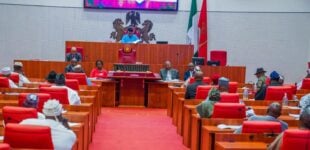
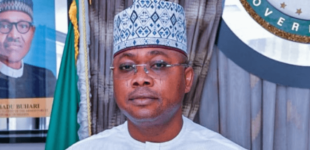
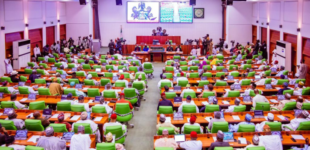


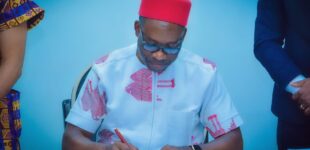
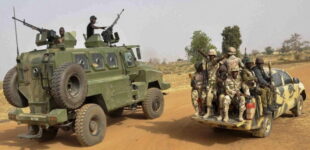
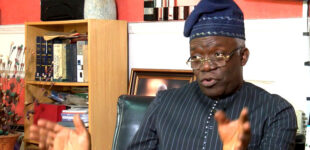

There are no comments at the moment, do you want to add one?
Write a comment